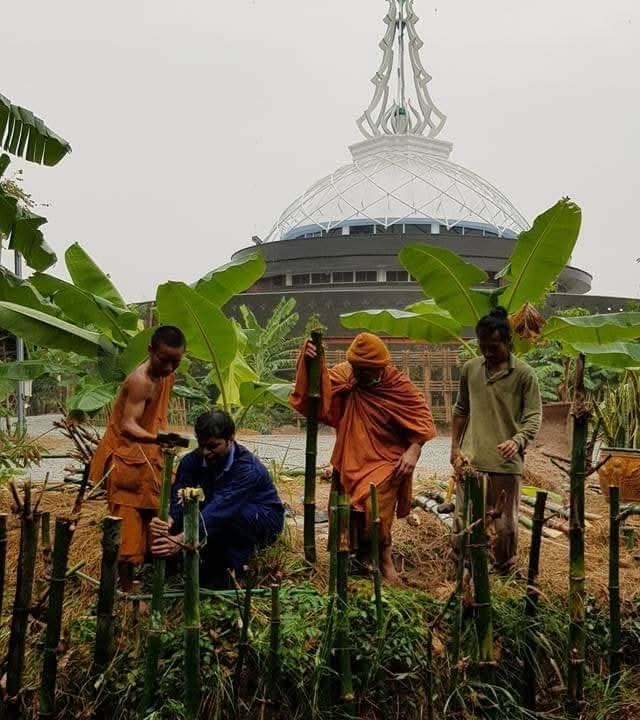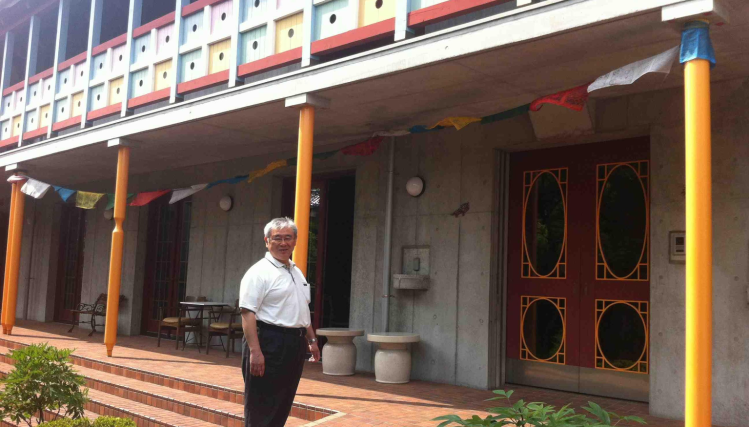Transforming Education through Unschooling
by Linus Dolfini
Bangkok, June 17, 2025
Rajesh Choudhary – commonly called Raj – is a member of the eco-temple network, and he is currently involved in two different ongoing projects, which try to offer alternative educational approaches. One of these projects is conducted in Thailand, with its main center in Chonburi and the other one is located in Jaipur, Rajasthan in India. Both projects provide their students with an education that is practice oriented and focused on teaching and learning in a way that is sustainable.
The project in Chonburi is conducted by the Mab Ueang Agri-Nature Center, a diverse, educational farm that has been founded over 30 years ago. It is a place where the knowledge of spiritual leaders from all over Thailand has been collected and alternative education has been developed. Explaining the philosophy behind the project, Raj mentions that schools are traditionally the places where we acquire knowledge. However, these days schools are not focused on conveying knowledge anymore, instead the curriculums are standardized, and people are primarily focused on getting degrees. The main goal of people has become to obtain certifications in order to find work. Knowledge is getting lost in this process since acquiring it and learning in a sustainable way are now only secondary goals.
The program at Mab Ueang is centered around the Buddhist concept of Bhavana, which translates into “development”, “cultivating”, “producing”, and “calling into existence”. Raj explains that at Mab Ueang they see their work not as schooling but as unschooling. Their first aim is not certification but rather sustainable knowledge that remains with the students and empowers them by allowing them to be active and contribute to their local communities later in their lives. The educational model they created starts with the individual interests of the students and the need of their communities. The students themselves specify which areas interest them and what they would like to learn during their time at the school. Starting from grade seven, they embark on a five-year journey of task-based learning. In this type of school, the students are encouraged to think locally. One of the key questions they must ask themselves, is: What impact can I have within one kilometer of my house? Because that is where their community is based, that is where they can have an impact and where their work should begin. Ultimately, the certifications the students earn at Mab Ueang are recognized by the government, but through this alternative approach at education, they also received training that was designed according to their personal interests, from organic farming, to photography, music, and natural building techniques. After the students graduate many of them stay connected to the Mab Ueang’s network. They return to the school as teachers and mentors, slowly transforming from learners to leaders themselves.
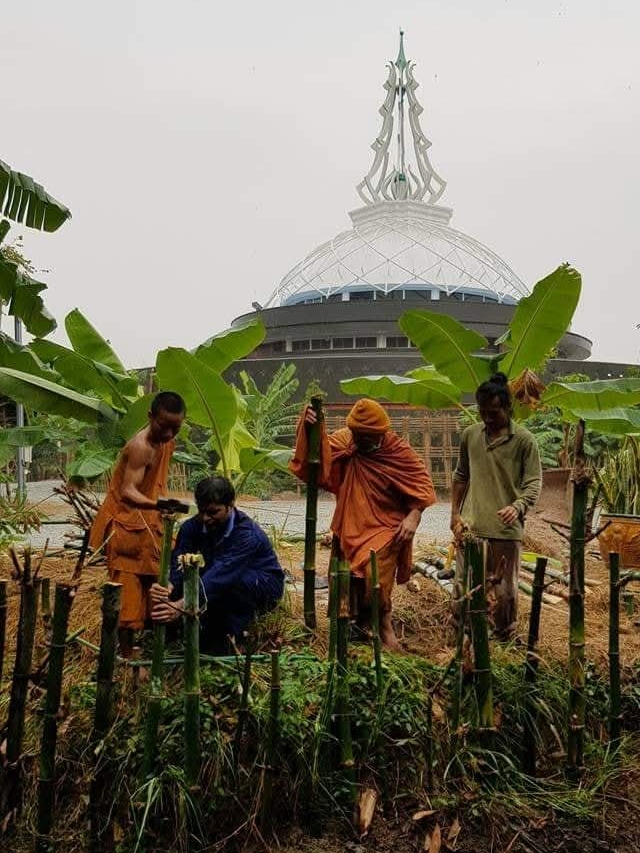
Enabling the students to be active in their respective communities after graduating is extremely valuable. Nowadays, many young people are fixated on getting well-paid jobs, leaving their communities behind to get a higher education and eventually work in the city. Up to a point that is a natural development, since the villages they are from are not normally rich and therefore not able to sustain their livelihoods. Hence, moving to the city is a logical choice. Mab Ueang is focused on helping young people develop skills so that they can stay in their communities and engage in a way that helps the community to develop and become more self-sustainable. Through this more opportunities for future generations are created and other young people are incentivized to stay in their hometowns rather than leave them behind. Raj mentions that at the core Mab Ueang is an agricultural foundation. So, most of the work that they are doing with their students is about proper farming. Students are taught the basic steps of not following monocultures, but rather permacultures. Diverse cultures, which do not produce too much waste and are sustainable and self-sufficient. A lot of this knowledge is not new, but rather traditional knowledge that has been around for many generations. The students get re-introduced to these traditional ways, which they can then implement on their own farms to support their communities.
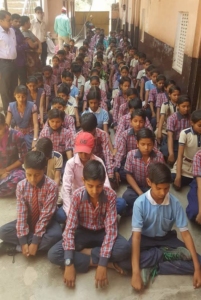
In Thailand, the main base of the project is located in Chonburi. Next to that there is always a second base somewhere in Thailand. Because the educational program that is offered is not bound to one specific place like a traditional school, it is a “tasked based moving school”. Every five to ten years, after two batches of students successfully graduate and innovative approaches are implemented in their community, the school moves place. After graduating the students are free to pursue their own path. Some of them join the main center in Chonburi, others join the new school to be teachers during the next cycle. The old study centers become places for tourists and visitors, where they are introduced to Mab Ueang’s work and learn about its methods. With its mobile school, the initiative has been able to regenerate landscapes and support different communities over the years. This approach revives the ancient Buddhist ideal of harmoniously integrating schools, temples, and communities, to create a sustainable society.
The second project Raj has been involved in, is in Jaipur, Rajasthan, India and it has been running parallelly during the last 20 years. The idea is to reconcile people with Buddhism while offering them the possibility to study. This is a challenge, since many people in India are not familiar with Buddhism anymore and some have forgotten about it completely, according to Raj. To bridge this gap, Thai and local monks are invited to lead Dhamma trainings for those who are not familiar with the Buddhist religion and its practices. Much like the Thai model, the curriculum is centered around unschooling, which helps the students to acquire concrete knowledge, based on the needs of their communities, rather than basic textbooks. The education system in India is problematic, often education has to be delivered through grassroots networks. Especially in the case of lower-caste people since the government schools do not meet their needs. Raj explains, that through this project, they are trying to create a system that does.
Mostly the project targets unprivileged lower-caste women and girls, to help them get an education and eventually an income of their own. This is important because of the standing women have in Indian society today. Raj describes a discussion he had about this with a friend, where she explained that Indian women are still expected to fulfill very traditional roles. They are expected to stay at home and do care work, manage the household, raise the children, and look after the elderly. This however puts women in a vulnerable position. If something happens to their husbands, they are left without any source of income. Supporting women and providing them with a chance to earn their own money is a key step.
The project currently running in Jaipur and in the nearby district in Rajasthan is rather small. There is no project center, so the trainings take place in people’s houses. The educators visit the students in their homes to teach them. This is also due to complicated regulations and Indian bureaucracy which make it very difficult to build and establish a center somewhere. Next to Raj, another person who engages in supporting the project in India is Manish, one of the founders of the Shiskshantar movement in Udaipur. He is interested in the approach of unschooling and helps the students to build connections. This is extremely valuable, because to get a job in India it is necessary to have the right connections, simply having a certificate is often not sufficient. Therefore, having a reference person who can attest that you will do better work than others regardless of their certifications is very valuable. Manish invites the students who are interested to his learning center, and he connects them to potential employers, for example luxury hotels or restaurants.
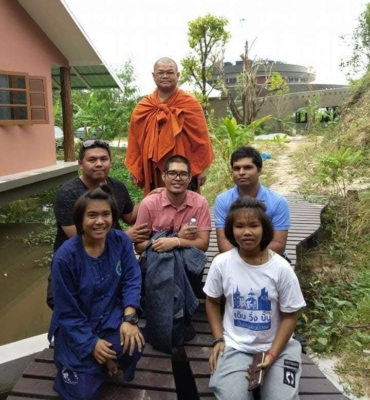
Both projects – the one in Chonburi and the one in Jaipur – are designed for long-term success. Raj mentions that it takes three generations for the positive effects of their work to fully unfold. Because although they offer people training, the society does not currently allow its students to make full use of the knowledge they have acquired. The older generations in their families will be skeptical of the new approaches, especially in India. And the second generation, the children of today’s students, will grow up with contradictory views. Because although they grow up with the practices of their parents, they see that the older generations – their grandparents – do things differently. Only the third generation will grow up in an environment in which the practices that students learn today are fully implemented in their families.
The project in Thailand and the project in India are at different stages in their development. In India, the project has a rather low profile, as the people involved come from very poor backgrounds, which makes it difficult to raise sufficient funds to conduct the project. In Thailand on the other hand, the project is well established and has reached a professional level. The center in Chonburi gets more and more connected internationally and within the eco-temple network. People from various other projects are coming to Thailand to learn about the approaches and the philosophy that are taught there. In July 2025 for example a group of twenty people from Taiwan will visit Chonburi and in November 2025 Mab Ueang will host visitors from the United States. Moreover, members of the Bhutan Soul Farmers – another eco-temple project – are planning to come to Thailand to study at Mab Ueang’s school for three years. According to Raj, both projects are focused on building connections between people from different countries and gaining international profiles. The fact that they are open to everyone is their strength. Students regardless of their background and economic situation are welcomed. As for teachers, Raj mentions that they believe everyone can contribute something. Some speak English fluently; therefore, they can be English teachers, others are musically talented and can teach their students how to play instruments. Overall, everybody that wishes to come and study or provide their knowledge gets a chance. Food and accommodations will be provided, says Raj, you only need to be committed and make sure you give 100 percent during your time at the project.

